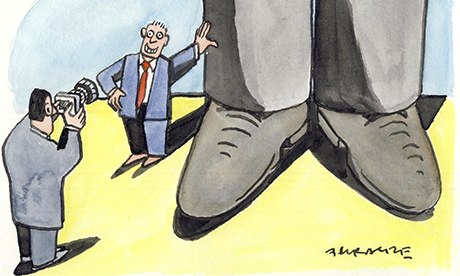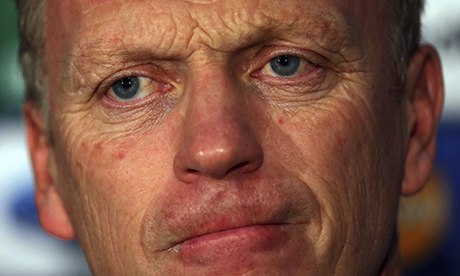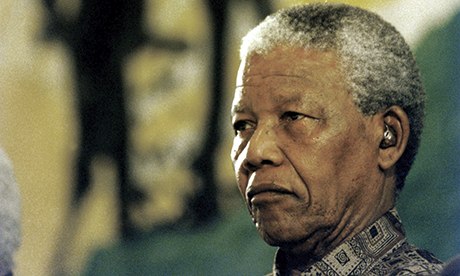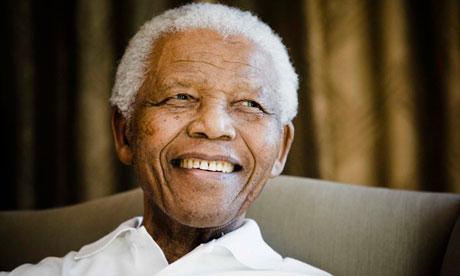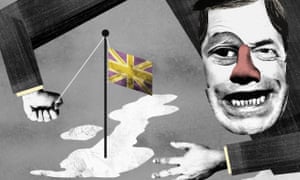
‘Don’t get me wrong on Nigel – he’s fine for a fag, a pint, some jolly japes on the Thames.’ Illustration: Nate Kitch
Right now, in the Ukip bunker, there is a search going on. It is urgent. It is probably desperate. It is the search for a tone. The emotional Rolodex of Nigel Farage is being riffled through in the hope it might throw up something usable. Top presentational aides have been dispatched on a vital quest to find the outer limits of his range. The journey is unlikely to detain them very long. Yet at the most recent reckoning Farage stands a few disputed percentage points away from being acclaimed – like it or not – the most extraordinarily successful British politician of a generation. Globally, he may soon be seen as reflecting us.
A man who yesterday morning was standing in front of a poster eerily similar to genuine Nazi propaganda is today in seclusion, his campaign suspended – like all the official referendum efforts - “out of respect”. And, presumably, out of uncertainty as to what the hell he does next.
Yesterday morning Farage was playing dog-whistle politics. Forgive me: he was playing whistle politics. Understanding the import of the words “BREAKING POINT” across a snaking queue of stricken brown-skinned people does not require ultrasonic capabilities. You can stand down, Lassie. You’re not needed today, girl.
Yesterday afternoon, the MP Jo Cox was killed in the street in her Batley and Spen constituency. That her alleged killer had years of mental health issues seems likely. That he is alleged to have shouted, “Britain first” – perhaps a reference to an organisation with which Ukip were last year forced to deny an electoral pact – is a matter of acute sensitivity. If the party barkers were a hundredth as careful about anything else as they are instructing everyone to be about that alleged “Britain first” cry, then they would have moderated themselves into retirement years ago.
“We are not won by arguments that we can analyse,” the great liberal supreme court justice Louis Brandeis observed, “but by tone and temper; by the manner, which is the man himself.”
Character is not always destiny, but tone matters. As we head towards polling day, all eyes must be on the man himself, Nigel Farage, who did more to bring about this referendum than any other, and whose artless, divisive bait-and-switch has felt like its governing spirit. How bound up Britain’s destiny has seemed with the character of this rather small man. Where does Britain’s-most-successful-politician-in-waiting go from here? Cometh the hour, whence cometh the tone?
Farage will, of course, have to find some words that address the utter loathsomeness of where we find ourselves, and the shame and despair it makes many people feel. Like him or not, David Cameron can do this. Like him or not, Jeremy Corbyn did so on Thursday. Together in Birstall, they found the bearing. And then … Well, it ought to be noted mildly that Thursday’s repulsive poster was merely the first in a planned series. Will we see the rest? At this moment of national and personal destiny, will Farage manage to be the politician of stature he assures us he is?
Hitherto, Farage has had a tried and tested shtick for Serious Moments. I notice it all the time now, but I first saw it when I asked him with sledgehammer flippancywhether Nelson Mandela was one of his political heroes. Immediately, Farage lowered his voice and opened his eyes very wide. “He’s a human hero,” he intoned. “That day he came out of Robben Island” – it wasn’t Robben Island, but anyway – “and stood there and forgave everybody, I just thought: ‘This is Jesus.’” Hugely idiosyncratic for a man on the right of the Tory party at the time, considering most of his political soulmates had only just given up wearing “Hang Mandela” badges, but there you go. “I don’t regard him as a political hero,” Nigel went on very quietly and with his eyes still open very wide. “I think he’s on a rather higher plane than that.”
Drop the voice, widen the eyes. He’ll probably do it this weekend. He certainly does it when anyone accuses him of borderline racism. Down goes the voice, as though he is personally trying to smother their insinuation in the appalled hush it deserves. I have to confess the Farage mind trick doesn’t work on me. Instead, every time Nigel deploys it, it makes me think of a Truman Capote line from In Cold Blood. “The quietness of his tone italicised the malice of his reply.”
That the political atmosphere was febrile and fetid before Jo Cox’s death hardly needs stating. “How foul this referendum is,” wrote the novelist Robert Harris this week. “The most depressing, divisive, duplicitous political event of my lifetime. May there never be another.” Boris Johnson’s sister Rachel has since retweeted the observation.
So many of the things that have felt bizarre or even vaguely comic at one Atlantic Ocean’s remove have suddenly alighted on our shores. Lies are knowingly painted on buses; previously unsayable things have been said on platforms that lend them a hideous legitimacy; the word “expert” has become as dirty as the word “Westminster”; and the shift to post-factual political discourse feels rapidly under way. No one is more post-fact than Farage. Asked why he was back on the cigs again this week, he replied: “I think the doctors have got it wrong on smoking.”
Don’t get me wrong on Nigel – he’s fine for a fag, a pint, some jolly japes on the Thames. The entire campaign’s only moment of levity came on Wednesday, as his flotilla did battle with Bob Geldof’s. In fact, it was while aboard Farage’s boat that I saw two children on one of the small remain dinghies and wondered who they were. They looked the same age as my eldest two – about five and three – and I thought how hilarious and exciting mine would have found the whole spectacle. I smiled and waved at them, because there is obviously a law stating that people in or aboard funny forms of transport should always wave at children. I only found out the next day that those children had been Jo Cox’s. Her husband Brendan had tweeted: “Kids seriously disappointed there isn’t another flotilla today.”
My God, the horror. Lying in wait, the unthinkable horror. Twenty-four hours later, Brendan Cox was issuing a statement on his wife’s murder. That he was able to find the words and tone that I am sure I never could in such unimaginable circumstances has been a thing of marvel to so many. We know the heights of humanity when we see them.
And I’m afraid we know when we don’t. I’m not sure I’ve ever heard humanity emanate from Nigel Farage, certainly not convincingly. On the eve of what he hopes will be his finest hour, he must rise to the challenge now. People expect. Britain expects. If you haven’t the words and the deportment for this sort of horror, and the politics that the timetable dictates will have to be conducted while it is still so fresh, then you are not fit for office or the sniff of it.
There are many people I respect and admire voting leave – there are people in my family voting leave. I understand their reasons. But they must stomach the reality that a vote for leave will be taken by Farage and countless others as a vote for him, a vote for his posters, a vote for his ideas, a vote for his quiet malice, a vote for his smallness in the face of vast horrors. Is it worth it?

